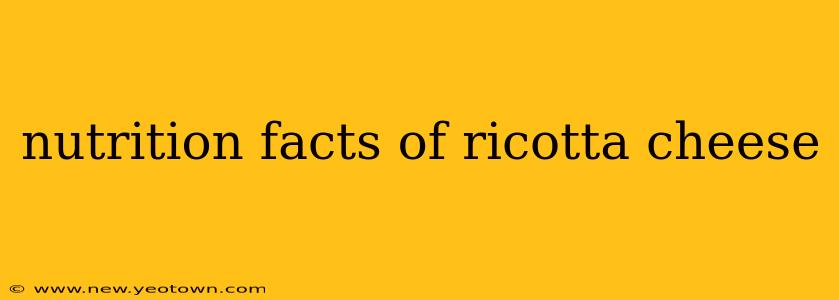Ricotta, with its subtly sweet and creamy texture, has charmed its way into hearts (and kitchens!) worldwide. But beyond its delightful taste, lies a nutritional profile worth exploring. This isn't just another bland dairy product; ricotta offers a unique blend of nutrients that can contribute to a healthy diet. Let's delve into the fascinating world of ricotta cheese nutrition facts.
What are the macronutrients in ricotta cheese?
Ricotta's macronutrient profile varies slightly depending on the fat content (whole milk, part-skim, etc.). However, generally speaking, a 100g serving offers a decent amount of protein, a moderate amount of fat, and relatively few carbohydrates. This makes it a versatile ingredient in both sweet and savory dishes. Imagine the protein boost in your morning pancakes or the creamy richness it adds to your lasagna!
How much protein is in ricotta cheese?
Protein is a crucial component of a balanced diet, essential for building and repairing tissues. Ricotta shines in this department. A typical 100g serving of whole milk ricotta packs approximately 12-14 grams of protein. This makes it a valuable source of this essential macronutrient, especially for those seeking to increase their protein intake. Think of it as a delicious way to support muscle growth and overall health.
Is ricotta cheese high in fat?
The fat content of ricotta cheese is heavily influenced by the type of milk used to make it. Whole milk ricotta will naturally be higher in fat than part-skim or low-fat varieties. While whole milk ricotta contributes a significant amount of fat, much of this is saturated fat. However, the amount of fat shouldn’t deter you entirely; fat is a vital part of a balanced diet, providing energy and aiding in the absorption of fat-soluble vitamins. Choosing a lower-fat version allows you to enjoy the creamy texture while managing your fat intake more effectively.
What are the vitamins and minerals in ricotta cheese?
Ricotta isn't just about protein and fat; it's also a surprisingly good source of several essential vitamins and minerals. It's a decent source of calcium, vital for strong bones and teeth. You'll also find a good amount of riboflavin (vitamin B2), important for energy metabolism and healthy skin. Furthermore, ricotta contains smaller amounts of other B vitamins and minerals like phosphorus and selenium, contributing to various bodily functions. It’s a nutritional powerhouse in disguise!
Is ricotta cheese good for weight loss?
This is a question often asked, and the answer is nuanced. While ricotta does provide protein, which can aid in satiety and help manage weight, the fat content can impact calorie intake. Opting for low-fat or part-skim ricotta can significantly reduce the calorie count per serving, making it more suitable for weight management. The key is moderation and mindful consumption. Remember to incorporate ricotta into a balanced diet and exercise plan for optimal weight loss results.
How many calories are in ricotta cheese?
The caloric content of ricotta fluctuates depending on the fat content. Whole milk ricotta generally contains more calories than lower-fat alternatives. A 100g serving of whole milk ricotta can range from around 170-200 calories. Low-fat versions will significantly lower that number. Always check the nutrition label on the specific product you’re using for the most accurate calorie count.
What are the potential health benefits of ricotta cheese?
Beyond its nutritional profile, ricotta can offer several potential health benefits. Its high calcium content supports bone health, while its protein contributes to muscle building and repair. The vitamins and minerals it contains support various bodily functions, contributing to overall well-being. Remember, as with any food, moderation and a balanced diet are key to realizing the full potential benefits.
This exploration of ricotta cheese nutrition facts aims to give you a comprehensive overview. Remember to always check the specific nutritional information on the packaging of the ricotta you purchase, as values can vary depending on the brand and fat content. Enjoy the creamy goodness responsibly!

